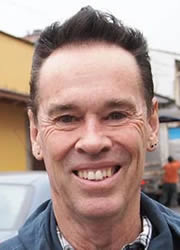Eric Braithwaite (1927-1998) began part time university study at the suggestion of mature-age friends, having worked in various manual jobs and as a truck driver after leaving secondary school. He studied philosophy and social science and, following a stint in the Child Welfare Department working with truants, was appointed to a lecturing position in Education at University of Auckland, New Zealand. His formal philosophical training did not mesh well with the version of educational philosophy taught in the Department of Education at that time, which was grounded in the study of John Dewey and Progressivism. Eric steeped himself in the work of Weber and read widely in structuralist sociology, anthropology, and the economics of education, and moved into teaching sociology of education. A natural, left-leaning progressive with a deep commitment to ‘the least advantaged,’ Eric’s evolving interest in the relationship between education, economics, and increasing inequality forged a keen interest in critiques of formal education. He subscribed early to the ‘new’ sociology of education, embarked on a decade of reading Marx and a diverse literature in the Marxist tradition, alongside the works of radical social and educational critics like Ivan Illich, Neil Postman and Charles Weingartner, Paulo Freire, Sam Bowles and Herb Gintis and, notably, Letter to a Teacher by The School of Barbiana (1969).
Eric published relatively little by current measures, and most of what it gelled around was a broad conception of the political economy of education, in which the questions of who benefits/whose interests are most served, and how, were central. During the 1970s he contributed a state of the art publication on education and economics, with B.J. Ogilvy to a collection edited in 1970 by Richard Bates (Hodder and Stoughton) addressing Prospects in New Zealand Education. With Allan Levett, he published a highly prescient report for New Zealand Libraries on The growth of knowledge and inequality in New Zealand society, pp 50-73. The latter argued that New Zealand libraries had responded uncritically to marketplace demands of educated elites and sophisticated technology, thereby contributing to increased social inequality, and should embrace an “equality imperative” to guide future planning of library services and resources.
His interest in the political economy of education yielded two carefully-argued, historically- and sociologically-contextualised papers published during the 1980s in Access and now available in the Access Archive: Education and equality, 1982; and Proposals for the financing of education after compulsory schooling, 1987). In “Equality and education” (1982) he considers equality in terms of ‘equivalence of the difference and unique,’ and defines equality of educational opportunity as ‘providing all children and young people with full opportunities for developing their particular talents, qualities and inclinations to the limits of their individual capacity’ (p. 39) – in accordance with an equal right of all to be different from one another, and all interests, inclinations, and talents to be taken to be equal in value and right to cultivation. Recognising that such a conceptual of equality of educational opportunity is incompatible with the social and economic inequality inescapable under capitalism, he argues that ‘if it is not to be self-stultifying’ a belief in genuine equality in education ‘commits us necessarily to social and economic equality: that is, to socialism’ (p. 42), This argument comes as close as anything in his published work that I know of to summing up Eric’s personal philosophy and political economy of education.
His philosophy of education (and life more widely) played out in his everyday politics of being an academic. For Eric, ideas and ideals were of little use if they were not part of a personal and collective praxis based on principles like serving the underserved and distributing resources on the basis of contributing to the needs of others in accordance with one’s ability to contribute. His idea of academic courses was to offer an umbrella theme under which students could pursue their particular interests and share these in a guided seminar setting devoted to ensuring that each participant could pursue their chosen line of inquiry with maximum input and discussion from others in the class (see the Auckland University student magazine Craccum article in Notes). His large personal library was fully at the disposal of his students and colleagues alike.
Sometimes this commitment played out in small ways that nonetheless benefited others enormously. So, for example, when he was sent a promotional copy of Foucault’s Discipline and Punish he saw immediately how Foucault’s approach to investigating ‘punishment’ differed radically from the conceptual analytic approach hitherto taken by his close colleague Jim Marshall (James D. Marshall). He gave the book to Jim, who had not previously encountered Foucault. Anyone familiar with English language philosophy of education since the 1980s knows exactly how that played out.
At a quite different level, one of Eric’s and my regular evenings over one bottle of wine too many in the early 1980s yielded a pronouncement by Eric that went roughly as follows.
There is something that has increasingly troubled me recently. Here in Auckland we have the largest Polynesian population in the world, yet there is not one Maori or Pacific Island lecturer in our Department (Education).
Over that last bottle, we decided it had to be an agenda item for the next departmental staff meeting. Eric duly moved the proposal and it was passed unanimously. It was resolved to advertise a Lectureship position. Linda and Graham Smith applied jointly for this position and were duly appointed on a job share basis [Linda Tuhiwai Smith & Graham Hingangaroa Smith]. The enrollment response was overwhelming, to the point that the single position quickly became two positions. Within 3 or 4 years (from memory) the Maori and Pacific Island Education (RUME) interest area occupied a full floor of the Education building and additional staff were appointed. All it took to get it going was having the idea and projecting it into a staff meeting.
It took Eric to have the idea, and to move it to a receptive audience: applied philosophy of education at its best.
Eric served on the inaugural New Zealand-based Executive of PESA (1983-1985).
Notes
An article about Eric: Money Means Learning – Craccum, 1970 (p. 11)
At a recent education I lecture, lecturer Eric Braithwaite gave research evidence of the unequal education opportunities for children of various socio-economic types. Reporting for example on the research done by NZUSA education research officer Lindsay Wright in 1969 Mr Braithwaite said that 34% of NZ university students have parents in an income bracket enjoyed by less than 4% of the population; and that only 16% of NZ university students have fathers with less than UE, a feature of 80% of the population.
Later in the lecture, Mr Braithwaite made the general point that for those who cared to reform the education system in non-violent ways, scientific research and factual evidence is essential. In arriving at an effective means of reform, basic educational theory and scientific evidence must be considered.
An education I student then spoke up, declaring that he did care for reform, and was not alone in this, and asked Mr Braithwaite whether he would be willing to add this kind of information to the present lecture content.
Mr Braithwaite then asked the class as a whole whether this was wanted. Ready affirmation was expressed in various forms. Mr Braithwaite then agreed: that as he described each aspect of the N.Z. education system, he would add to his lecture whatever information he had which would be relevant to reform in that area (a) in the direction of more equal opportunity for education of all socio-economic types (b) in the direction of an education system more sensitive to the varying needs of individuals.




